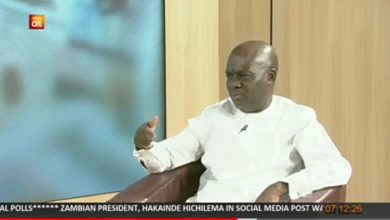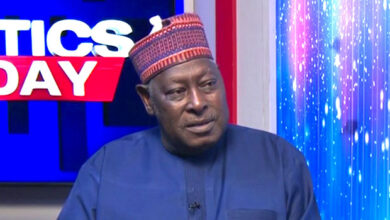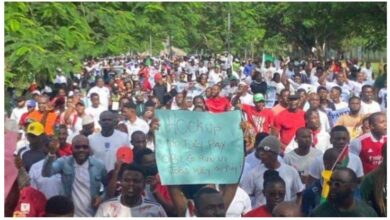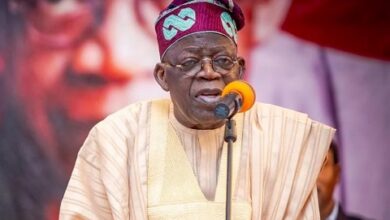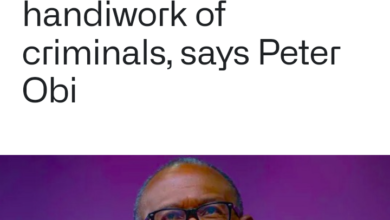Today's Headlines: Bloated Structure: Tinubu, New Govs To Get 48 Ministers, 560 Commissioners; Tinubu Nominates Keyamo, Mahmud As Ministers

Tinubu, New Govs To Get 48 Ministers, 560 Commissioners
Photo Credit:Punch papers
Amid concerns around the high cost of governance, the 48 ministerial nominees whose names were forwarded to the Senate for clearance by President Bola Tinubu, and about 560 commissioners-designates in 27 states of the federation, where elections held in May this year may cost the country about N23.4bn in salaries, findings by Saturday PUNCH have shown.
The figure was based on the recommended salaries and allowances for ministers and commissioners by the Revenue Mobilisation and Fiscal Allocation Commission.
Aside from the annual basic salaries, the figure includes such as allowances for accommodation (200 per cent of basic salary), domestic staff (75 per cent of basic salary), utilities (30 per cent of basic salary), house maintenance (five per cent of basic salary), wardrobe (25 per cent of basic salary), furniture (300 per cent of basic salary), motor vehicle fuelling allowance (75 per cent of basic salary), and entertainment allowance (45 per cent of basic salary), among others.
The furniture allowance is paid once every four years.
Tinubu has set the record for the highest number of ministerial nominees in Nigeria’s Fourth Republic (1999 to date) with 48, which experts said would likely worsen the high governance costs.
The President’s nominees topped the 42 appointed by his predecessor, Muhammadu Buhari, in 2019 by five more persons.
A week ago, Tinubu nominated 28 persons to be cleared by the Senate as ministers. On Wednesday, the President sent another list of 19 nominees, making a total of 47 potential cabinet members.
Tinubu Nominates Keyamo, Mahmud as Ministers
Photo Credit:The Nation papers
President Ahmed Bola Tinubu has forwarded the name of Festus Keyamo, a Senior Advocate of Nigeria (SAN), (Delta) to the Senate for screening and confirmation as a Minister in his cabinet.
He also nominated Mariya Mahmoud Bunkure from Kano State as a Minister.
Photo Credit:Google
Obi Laments GSK’s Exit From Nigeria, Blames Poor Economic Management
Photo Credit:Channels Television
The presidential candidate of the Labour Party in the 2023 election, Peter Obi, has regretted the impending exit of British pharmaceutical giant GlaxoSmithKline (GSK) from Nigeria after 51 years.
This follows the company’s announcement of plans to end its prescription medicines and vaccine production in the country.
In a statement sent to the Nigerian Exchange Limited, the multinational pharmaceutical company said it would transition to a third-party direct distribution model for its pharmaceutical products.
Reacting to the development in a tweet on Friday night, Obi said that the company’s reason for leaving Nigeria is even more disheartening as they no longer perceive a prospect for the country as a business environment that would be anchored on productivity.
According to him, these are some of the consequences of the cumulative poor management of our economy.
As a result, millions are losing their jobs and our poverty index is worsening, even though we’re already being perceived as the world’s poverty capital,” the post read in part.
He further wrote, “The multinationals that are leaving our country have not only created jobs but have created immeasurable training that contributed immensely to our human capital development over the years
Crude Oil Thieves Live In Abuja, Barracks–Okaba
Photo Credit:The Sun papers
Prof. Benjamin Okaba, President, Ijaw National Congress (INC), in this interview, speaks on activities of non-state actors in the Niger Delta region, crisis in Ijaw Youth Council, oil theft in the region and efforts of INC to restore peace, among other issues.
With the level of insecurity in Nigeria, what is the effect of the growing non-state actors in our country?
In the first place, it tells you that the formal security architecture of this country has been compromised. Ordinarily, what these non-state actors seem to be doing is the responsibility of the police, military and other agencies that are empowered to secure the lives and properties of Nigerians. But talking about the implications, definitely, we have to talk about community policing but this is not the direction it should take. In terms of some kind of stop-gap approach to dealing with the immediate issues, I don’t think they should be allowed to continue for too long.
They should be regulated or stopped entirely. Yes, some are pledging loyalty to the Federal Government but we have not seen what the responses are from the Federal Government to the extent of either encouraging or discouraging these outfits. I think the government should take a stand on these issues, if not we are heading into the proliferation of so many militia bodies and that is not good enough for this country.
What is the latest development in the crisis rocking the Ijaw Youth Council and what are the challenges?
As you know, Ijaw Youth Council is a product of collective consciousness of the Ijaw people to have a youth organisation properly coordinated to articulate their aspirations concerning the self-determination drive of the Ijaw Nation. Precisely on December 11, 1998, over 5,000 Ijaw youths gathered at the community called Kaiama, representing over 40 clans coming from several clubs and they collapsed all their structures and had what they called the Kaiama Declaration. And there, the IYC was formed as a youth body of the Ijaw Nation.
El_Zaxks (
)

